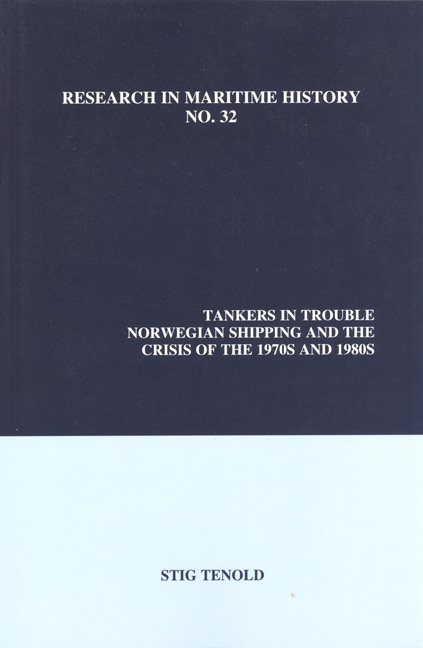Book contents
- Frontmatter
- Table of Contents
- List of Tables in the Text
- List of Illustrations
- Preface
- Chapter 1 Introduction
- Chapter 2 The Shipping Market after World War II
- Chapter 3 The Basis of the Tanker Crisis
- Chapter 4 The Contagion and Short-term Effects of the Crisis
- Chapter 5 Stage Two of the Crisis and the Long-term Changes
- Chapter 6 The Basis for the Crisis in Norwegian Shipping
- Chapter 7 Structural Transformations in Norwegian Shipping
- Chapter 8 The Fates of Four Norwegian Shipowners
- Chapter 9 Conclusion
- Appendices
- Bibliography: Select Bibliography
Chapter 6 - The Basis for the Crisis in Norwegian Shipping
- Frontmatter
- Table of Contents
- List of Tables in the Text
- List of Illustrations
- Preface
- Chapter 1 Introduction
- Chapter 2 The Shipping Market after World War II
- Chapter 3 The Basis of the Tanker Crisis
- Chapter 4 The Contagion and Short-term Effects of the Crisis
- Chapter 5 Stage Two of the Crisis and the Long-term Changes
- Chapter 6 The Basis for the Crisis in Norwegian Shipping
- Chapter 7 Structural Transformations in Norwegian Shipping
- Chapter 8 The Fates of Four Norwegian Shipowners
- Chapter 9 Conclusion
- Appendices
- Bibliography: Select Bibliography
Summary
International shipping is by definition a very mobile industry. The primary means of production are vessels traversing national borders, and owners do not have to conform to the same restrictions on location as do agents in many other markets. Shipping has gradually become detached from national markets with regard to the provision of capital and labour and consequently has acquired an increasing share of its factors of production in international markets. Nevertheless, a large proportion of transport capacity is owned in a handfiil of important shipping nations. Norwegian shipowners have played an important role in the international shipping market since the mid-nineteenth century.
The importance of Norway as a major maritime nation was also reflected in support functions such as shipbroking, insurance, research and classification. Moreover, there has been a relatively strong relationship between Norwegian shipowners and the domestic shipbuilding and ship equipment industries. Despite the fact that shipowners purchase their vessels in the international market, Norwegian shipping has functioned as a catalyst for, and been an important purchaser from, the domestic shipbuilding industry.
Norway's significant international role was mirrored in the importance of shipping to the Norwegian economy. In 1974 domestic/coastal and foreigngoing vessels accounted for nine percent of the country's capital stock and four percent of employment. The foreign-going fleet is more capital intensive than the coastal and uses non-Norwegian seamen to a greater extent, so the difference between capital and employment would be even more marked if only the deep-sea merchant marine is considered. The fleet operating in international waters accounted for 2.6 percent of Norwegian employment.
The shipping sector has always been important to the Norwegian economy. Yet during the last 200 years it has changed from mainly transporting Norwegian imports and exports to a service industry in which most of the demand originates abroad. As shipping services have mainly been sold internationally, it has been crucial to the Norwegian balances of trade and payments.
Gross freight earnings - the remuneration from the sale of transport services - accounted for somewhere between thirty-five and fifty percent of total Norwegian exports in most years from 1870 to 1970. Put another way; foreign revenues from Norwegian shipping facilitated between a third and a half of imports and largely neutralised the merchandise trade deficit. Naturally, a considerable part of the income was spent by shipowners in purchasing vessels from foreign yards or on costs accrued abroad.
- Type
- Chapter
- Information
- Tankers in TroubleNorwegian Shipping and the Crisis of the 1970s and 1980s, pp. 107 - 148Publisher: Liverpool University PressPrint publication year: 2006

